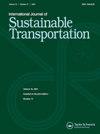Cargo bikes for personal transport: A user segmentation based on motivations for use
IF 3.9
3区 工程技术
Q2 ENVIRONMENTAL STUDIES
International Journal of Sustainable Transportation
Pub Date : 2024-09-01
DOI:10.1080/15568318.2024.2402753
引用次数: 0
Abstract
Building on the success of e-bikes, sales of e-cargo bikes are rapidly increasing in several countries. Cargo bikes fill an important gap in the urban transport market by combining the advantages of cycling with the greater transport capacity of a family car. Whereas most research on cargo bikes has focused on logistics, this paper addresses their use for personal transport. It is based on a large-scale survey in Switzerland among both proprietary cargo bike owners (CBO) and users of cargo bike sharing (CBS) (N = 955). A principal component analysis finds 3 families of motivations for using cargo bikes: transporting children, staying active, and reducing car use. Based on these 3 components, we use hierarchical clustering to identify 4 user segments: cargo transporters, enthusiasts, multimodals, and sustainable parents. Our results suggest that owned and shared cargo bikes are complementary and have the potential to attract new audiences to cycling and reduce car use. They could become a central component in a low-carbon/post-car urban mobility strategy. However, user experiences indicate that lacking safety, road infrastructure and parking provisions remain barriers to wider cargo bike use. We conclude by proposing a future research agenda for cargo bike research.
用于个人运输的货运自行车:基于使用动机的用户细分
在电动自行车取得成功的基础上,电动货运自行车的销量在一些国家迅速增长。货运自行车将自行车的优势与家用汽车更大的运输能力相结合,填补了城市交通市场的重要空白。关于货运自行车的研究大多集中在物流领域,而本文则探讨其在个人交通中的应用。本文基于一项在瑞士进行的大规模调查,调查对象包括货运自行车的所有者(CBO)和货运自行车共享的使用者(CBS)(N = 955)。通过主成分分析,我们发现了使用货运自行车的三大动机:接送孩子、保持运动和减少汽车使用。基于这 3 个成分,我们采用分层聚类的方法确定了 4 个用户群体:货物运输者、爱好者、多式联运者和可持续发展的父母。我们的研究结果表明,自有和共享货运自行车是互补的,有可能吸引新的受众骑自行车,减少汽车使用。它们可以成为低碳/后汽车城市交通战略的核心组成部分。然而,用户体验表明,缺乏安全、道路基础设施和停车规定仍然是更广泛使用货运自行车的障碍。最后,我们提出了货运自行车研究的未来研究议程。
本文章由计算机程序翻译,如有差异,请以英文原文为准。
求助全文
约1分钟内获得全文
求助全文
来源期刊
CiteScore
8.90
自引率
2.60%
发文量
56
期刊介绍:
The International Journal of Sustainable Transportation provides a discussion forum for the exchange of new and innovative ideas on sustainable transportation research in the context of environmental, economical, social, and engineering aspects, as well as current and future interactions of transportation systems and other urban subsystems. The scope includes the examination of overall sustainability of any transportation system, including its infrastructure, vehicle, operation, and maintenance; the integration of social science disciplines, engineering, and information technology with transportation; the understanding of the comparative aspects of different transportation systems from a global perspective; qualitative and quantitative transportation studies; and case studies, surveys, and expository papers in an international or local context. Equal emphasis is placed on the problems of sustainable transportation that are associated with passenger and freight transportation modes in both industrialized and non-industrialized areas. All submitted manuscripts are subject to initial evaluation by the Editors and, if found suitable for further consideration, to peer review by independent, anonymous expert reviewers. All peer review is single-blind. Submissions are made online via ScholarOne Manuscripts.

 求助内容:
求助内容: 应助结果提醒方式:
应助结果提醒方式:


